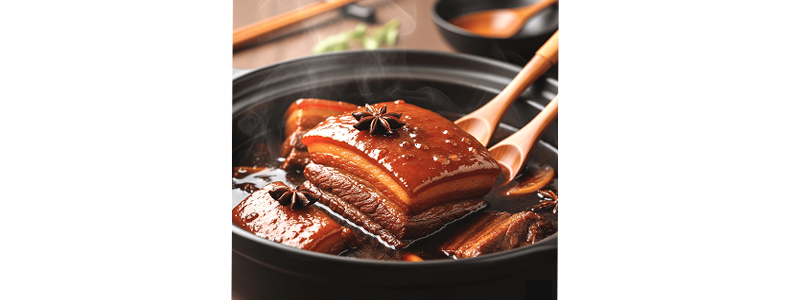HSK5 Reading Practice Remember to use the menu at the top right of the article to switch between Traditional and Simplified Chinese. Vocabulary 情感qínggǎn情感qínggǎnemotion, feeling 她tā把bǎ真實zhēnshí的de情感qínggǎn寫xiě進jìn了le日記rìjì裡lǐ她tā把bǎ真实zhēnshí的de情感qínggǎn写xiě进jìn了le日记rìjì里lǐShe wrote her true feelings into her diary. 依賴yīlài依赖yīlàito depend on 他tā太tài依賴yīlài朋友péngyǒu的de幫助bāngzhù, 缺乏quēfá獨立性dúlìxìng他tā太tài依赖yīlài朋友péngyou的de帮助bāngzhù, 缺乏quēfá独立性dúlìxìngHe depends too much on his friends’ help and lacks independence. 陪伴péibàn陪伴péibànto accompany 朋友péngyǒu的de陪伴péibàn讓ràng我wǒ覺得juéde很hěn安心ānxīn朋友péngyou的de陪伴péibàn让ràng我wǒ觉得juéde很hěn安心ānxīnThe company of friends…
Category: HSK 5
Chinese Recipe – Taiwanese Braised Pork
滷 肉卤 肉 lǔròu Taiwanese braised pork, or 滷肉卤肉 lǔròu, is a beloved comfort food that defines Taiwanese home cooking. This rich, savory dish features tender pork belly slowly simmered in soy sauce, rice wine, and aromatic spices until it becomes melt-in-your-mouth perfection. Traditionally served over steaming white rice as 滷肉飯卤肉饭 lǔròufàn, this iconic dish…
Story About My Grandma – 1
Transcript 哎ei, 其實qíshí我wǒ最近zuìjìn才cái知道zhīdào我wǒ的de爸爸bàba的de媽媽māma的de媽媽māma家庭jiātíng其實qíshí跟gēn我wǒ沒有méiyǒu真的zhēnde關係guānxī。 哎ei, 其实qíshí我wǒ最近zuìjìn才cái知道zhīdào我wǒ的de爸爸bàba的de妈妈māma的de妈妈māma家庭jiātíng其实qíshí跟gēn我wǒ没有méiyǒu真的zhēnde关系guānxi。 在zài我wǒ爸爸bàba的de媽媽māma也yě就是jiùshì我wǒ奶奶nǎinai那個nàge年代niándài, 在zài我wǒ爸爸bàba的de妈妈māma也yě就是jiùshì我wǒ奶奶nǎinai那个nàge年代niándài, 因為yīnwèi臺灣人Táiwānrén的de生活shēnghuó非常fēicháng的de窮qióng, 所以suǒyǐ他們tāmen沒有méiyǒu錢qián。 因为yīnwèi台湾人Táiwānrén的de生活shēnghuó非常fēicháng的de穷qióng, 所以suǒyǐ他们tāmen没有méiyǒu钱qián。 如果rúguǒ你nǐ生shēng了le雙胞胎shuāngbāotāi, 就是jiùshì2 個ge孩子háizi一起yìqǐ出生chūshēng的話dehuà, 如果rúguǒ你nǐ生shēng了le双胞胎shuāngbāotāi, 就是jiùshì2 个ge孩子háizi一起yìqǐ出生chūshēng的话dehuà, 他們tāmen沒有méiyǒu錢qián照顧zhàogù2 個ge孩子háizi, 他們tāmen就jiù會huì把bǎ其中qízhōng一個yíge孩子háizi送sòng給gěi別人biérén或者huòzhě是shì賣mài給gěi別人biérén。 他们tāmen没有méiyǒu钱qián照顾zhàogù2 个ge孩子háizi, 他们tāmen就jiù会huì把bǎ其中qízhōng一个yíge孩子háizi送sòng给gěi别人biérén或者huòzhě是shì卖mài给gěi别人biérén。 那nà我wǒ奶奶nǎinai就是jiùshì那個nàge被bèi賣掉màidiào的de孩子háizi。 那nà我wǒ奶奶nǎinai就是jiùshì那个nàge被bèi卖掉màidiào的de孩子háizi。 那nà我wǒ的de曾祖母zēngzǔmǔ為什麼wèishénme要yào買mǎi我wǒ奶奶nǎinai呢ní? 那nà我wǒ的de曾祖母zēngzǔmǔ为什么wèishénme要yào买mǎi我wǒ奶奶nǎinai呢ní? 這zhè也yě是shì一個yíge那個nàge時候shíhòu社會shèhuì很hěn常見chángjiàn的de迷信míxìn。 这zhè也yě是shì一个yíge那个nàge时候shíhou社会shèhuì很hěn常见chángjiàn的de迷信míxìn。 所以suǒyǐ在zài她tā買mǎi我wǒ奶奶nǎinai以前yǐqián, 她tā懷孕huáiyùn很hěn多duō次cì, 可是kěshì每měi一yí次cì都dōu流產liúchǎn都dōu失敗shībài。 所以suǒyǐ在zài她tā买mǎi我wǒ奶奶nǎinai以前yǐqián, 她tā怀孕huáiyùn很hěn多duō次cì, 可是kěshì每měi一yí次cì都dōu流产liúchǎn都dōu失败shībài。 那個nàge時候shíhòu的de人rén相信xiāngxìn必須bìxū要yào打破dǎpò這個zhège不好bùhǎo的de循環xúnhuán, 那个nàge时候shíhou的de人rén相信xiāngxìn必须bìxū要yào打破dǎpò这个zhège不好bùhǎo的de循环xúnhuán, 所以suǒyǐ呢ne, 她tā就jiù買mǎi了le我wǒ奶奶nǎinai, 把bǎ她tā當成dāngchéng她tā的de自己zìjǐ的de第一個dìyīge孩子háizi, 所以suǒyǐ呢ne, 她tā就jiù买mǎi了le我wǒ奶奶nǎinai, 把bǎ她tā当成dāngchéng她tā的de自己zìjǐ的de第一个dìyīge孩子háizi, 所以suǒyǐ她tā就jiù有yǒu了le一個yíge好hǎo的de開始kāishǐ, 一個yíge第一個dìyīge孩子háizi。 所以suǒyǐ她tā就jiù有yǒu了le一个yíge好hǎo的de开始kāishǐ, 一个yíge第一个dìyīge孩子háizi。 以後yǐhòu呢ne, 她tā就jiù可以kěyǐ比較bǐjiào容易róngyì有yǒu自己zìjǐ第dì2 個ge第dì3 個ge孩子háizi。 以后yǐhòu呢ne, 她tā就jiù可以kěyǐ比较bǐjiào容易róngyì有yǒu自己zìjǐ第dì2 个ge第dì3 个ge孩子háizi。…
Say A, then A – 說 shuō A 就 jiù A
Grammar Point:The Chinese structure 說说 shuō A 就 jiù A means doing something immediately after saying it, often without any hesitation, planning, or discussion. It can also express surprise or admiration at someone’s quick action, or be used to criticize someone for acting too impulsively. Structure 說说 shuō + V + 就 jiù + V…
There is A, and there is B too – 有 yǒu A 有 yǒu B
Grammar Point:The 有 yǒu A 有 yǒu B pattern is a concise and expressive grammatical structure in Chinese that uses parallel construction to indicate the presence of multiple elements or a comprehensive range. It’s important to note that this structure isn’t something you can just use with any words — it’s usually limited to a…
No A, no B – 沒 méi A 沒 méi B
Grammar Point:沒 méi A 沒 méi B, literally “no A, no B,” is used to emphasize a complete lack of certain things—usually two related nouns or qualities—and is often spoken in a casual, emotional, or disapproving tone. It’s important to note that this structure isn’t something you can just use with any words — it’s…
Chinese Causative Verbs – jiào, ràng, shǐ and lìng
Grammar Point:In Chinese, if you want to say that someone makes another person do something, or that something causes a feeling or action, you can use special words called causative verbs. The most common ones are 叫 jiào, 讓让 ràng, 使 shǐ, and 令 lìng. They all mean something like “make,” “let,” or “cause,” but they are used in different…
Without A, there is no B – 沒有 A 就沒有 B
Grammar Point:The Chinese pattern 沒有 méiyǒu A 就沒有 jiù méiyǒu B expresses a cause-and-effect relationship: A is the condition or foundation for B. It’s similar to the English expression “without A, there is no B. Structure 沒有 méiyǒu A + 就沒有 jiù méiyǒu B 沒有méiyǒu你nǐ就jiù沒有méiyǒu今天jīntiān的de我wǒ没有méiyǒu你nǐ就jiù没有méiyǒu今天jīntiān的de我wǒWithout you, then there’s no today’s me. 沒有méiyǒu努力nǔlì就jiù沒有méiyǒu成功chénggōng没有méiyǒu努力nǔlì就jiù没有méiyǒu成功chénggōngWithout hard work, there…
No matter how… still… – 再 zài… 也 yě…
Grammar Point:This structure 再 zài… 也 yě… emphasizes that B will not change, no matter how much or how many times A happens. It often shows determination, resistance, or a fact that doesn’t change. Structure S 再 zài A,(S) 也 yě B 他tā再zài努力nǔlì, 也yě考kǎo不bú上shàng那nà所suǒ大學dàxué他tā再zài努力nǔlì, 也yě考kǎo不bu上shang那nà所suǒ大学dàxuéNo matter how hard he tries, he still can’t get into that…
Shuō A jiù A
Grammar Point:This pattern 說说 shuō A 就 jiù A suggests that something unexpected happens suddenly or faster than anticipated, from the speaker’s perspective. It’s similar to the English expressions ‘just like that’ or ‘before you know it.’ Structure 說说 shuō A 就 jiù A The phrase is often used in informal settings and can convey…









